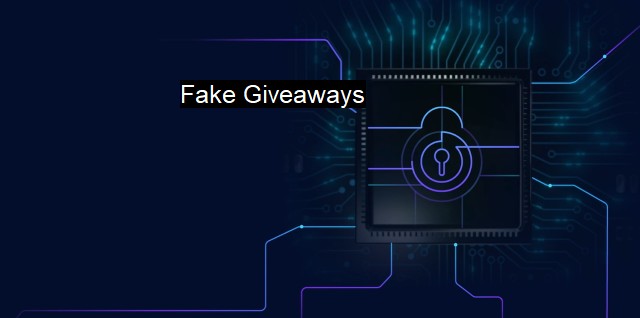What are Fake Giveaways?
How to Protect Yourself from Fake Giveaway Scams: An Overview of Cybersecurity Measures and Best Practices
In the age of cybersecurity and anti-virus software, online threats have significantly evolved and become more sophisticated than ever before. One method fraudsters use to trick users and steal their personal data or money is the concept of "Fake Giveaways". Despite appearing harmless on the surface, these frauds can lead to significant financial loss, compromising of personal data, and, in some instances, even identity theft."Fake Giveaways" typically involve a cybercriminal posing online as a genuine company or individual, offering giveaways of expensive products or large sums of money. The products could range from high-value electronics to luxury holidays, and cash amounts often figure in thousands. these giveaways are not legitimate, and ultimately aim at acquiring a user's personal information or tricking them into sending money.
The way a Fake Giveaway swindle generally functions involve unsuspecting internet users happening upon ads, social media posts, or promotional emails declaring them as winners or entering them into grand prize draws. The announcement often creates a sense of urgency, claiming that the person only has a limited time to claim the offered prize, driving them to act quickly and without thoroughly scrutinizing the details.
To claim the 'prize', targets of a fake giveaway scam are usually asked to undertake a series of actions. These may include sharing the post or ad, liking the specific webpage, leaving a comment, submitting personal information, and at times even carrying out direct payment for 'shipping' or 'tax'. Importantly, the purpose of the scammers is primarily data-phishing, intended to gather revealing details, ranging from full names, addresses, phone numbers, to as much as bank account details and credit card numbers.
Sometimes scammers might also ask for the downloading of a specific application, under the pretext of enabling the victims to receive their 'winning'. this downloaded application typically turns out to be malware that can extensively damage the user's device, or a kind of Spyware which records and transmits the user's actions and confidential data to the scammer. Cybercriminals can then use this information to conduct further fraudulent activities, like blackmail or accessing the victim's banking resources.
Cybersecurity measures and antivirus softwares play a crucial role in identifying & protecting users from such scams. This is why developers consistently work on updating these solutions to keep up with the ever-evolving online threats landscape. Modern practices such as machine learning and behaviour-based algorithms are being implemented to detect and quarantine malicious activities before they can cause harm.
In addition to software measures, educating users about potential red flags associated with fake giveaways can further help deter cybercrime. Enlisting practices such as examining the validity of giveaway sources, confirming email senders thoroughly, never divulging sensitive data and creating backups, aid largely in combating these issues on the front line.
"Fake Giveaways" are serious risks in the digital world where contending with cybercriminals is a constant battle of innovation, technical savvy, and vigilance. Understanding the danger they pose and taking preventative measures assure safety and the preservation of privacy for individuals. It's important to remember that if a deal appears too good to be true, it often is. Always be wary of these unrealistic giveaways to protect personal information and ensure safe browsing experiences.

Fake Giveaways FAQs
What is a fake giveaway scam?
A fake giveaway scam is an online scam where scammers pose as legitimate companies or organizations and ask people to enter their personal information or download harmful software in exchange for a chance to win a prize.How can I identify a fake giveaway?
One way to identify a fake giveaway is to watch out for suspicious URLs, fake social media accounts, and spelling errors in the company's name. Additionally, if the giveaway requires you to pay a fee or provide sensitive information, it is likely a scam.What can I do to protect myself from fake giveaways?
To protect yourself from fake giveaways, you should always verify the legitimacy of the company offering the giveaway. You can do this by researching the company online, checking for a legitimate website, and reading reviews. Additionally, you should never share your personal information or download anything from an untrusted source.What should I do if I have been scammed by a fake giveaway?
If you have fallen victim to a fake giveaway scam, you should report it to the appropriate authorities, such as the Federal Trade Commission (FTC) or your local law enforcement. In addition, you should consider running a thorough antivirus scan to ensure that your device has not been infected with harmful software.| | A | | | B | | | C | | | D | | | E | | | F | | | G | | | H | | | I | | | J | | | K | | | L | | | M | |
| | N | | | O | | | P | | | Q | | | R | | | S | | | T | | | U | | | V | | | W | | | X | | | Y | | | Z | |
| | 1 | | | 2 | | | 3 | | | 4 | | | 7 | | | 8 | | |||||||